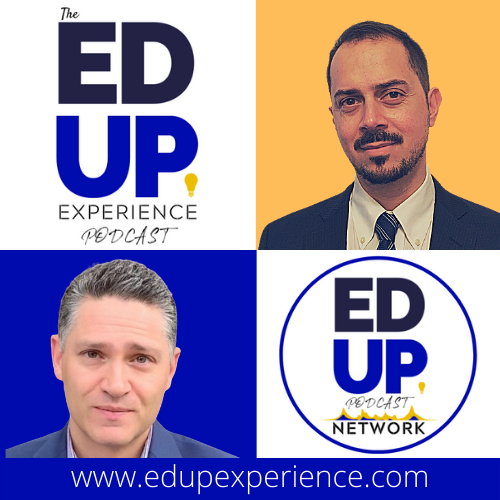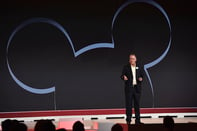Published on
The One-by-One Job of Higher Ed

As the world continues to face the pandemic, more students are questioning the value of higher education. This means institutions need to deliver the best experience to learners from the moment they show interest in the institution. In this interview, Dr. Joe Sallustio interviews Jeremy Moreland about higher education going forward, communicating ROI to students and supporting vulnerable students.
EdUp Experience: How’s everybody doing at St. Thomas as things are starting to move forward now?
Jeremy Moreland (JM): Certainly, this year has been taxing in ways we’re not accustomed to,, but it’s been a terrific year—we’ve actually been open all year long. We had so many students who wanted to be here in person, and we were flexible with those who wanted to attend virtually.
St. Thomas is a Catholic university with a rich, cultural and international diversity. We’re committed to the academic and professional success of our students, all of whom thus far have gone on to become ethical leaders in the global community. We leverage what has always been an excellent liberal arts education. And at the same time, we make sure our students are ready to execute a professional role in the real world. And we do that by listening to what our employers tell us they want from our students when they enter the workforce.
EdUp Experience: Can you talk about what you hear from employers? Are students ready?
JM: That’s certainly a theme I hear, but we actually get positive feedback from our employers—both about our approach and our students’ performance in the businesses and organizations that hire them. You hear a lot of people on the sidelines of higher ed talk about the soft skills that might be coming out of liberal arts-focused education.
But at St. Thomas, we’re really committed to the idea that those are essential skills, which reflects what we hear from employers. They tell us they want our students to be able to work with people different from them. They need people who can lead ethically, and these are all areas in which we prepare our students to excel in.
EdUp Experience: How do you keep ensure staff and faculty stay focused on personalization?
JM: It’s not easy for us to lose that focus because we’re really keen on making sure we hire faculty specifically focused on that kind of experience. We make sure our staff are structuring processes in ways that are invasive. So, they help support that mentoring relationship between students and faculty. If we were careless about the way we add to our faculty, I’m sure that would dilute our focus on this really transformational set of relationships. But we’re not. We know that it’s absolutely vital to the quality of the experience here, so we keep a laser focus on it as you suggest.
EdUp Experience: Can you speak about how intentional you are in creating a variety of programs?
JM: We take a very data-focused approach to making decisions about our programs. We have amazing faculty partners and leaders at the university who lead us through that process. So, we’re focused on making sure we’re finding pathways for students that will lead them to thrive after they graduate.
Data would suggest we’ve been doing a good job of that. In 2020, the US News and World Report recognized us as the number one regional university in the south for social mobility. So, we’re very excited about having so many first-generation college students, who go on to create a legacy of learning for themselves and their families.
So, how do we do that? First, we make sure we’re focused on career pathways that make sense for our students. We’re developing other pathway programs that really allow for a diversity of disciplines.
EdUp Experience: Can you speak a little bit about how the pandemic has changed the way we look at vulnerable students?
JM: I’d say we were well on our way to being aware, but certainly COVID allowed us to get even deeper insight into some of the challenges our experience. Some were very clear, pragmatic challenges, like a lack of access to sufficient Wi-Fi or broadband or to the technology to engage in class. And we were able to solve some of those problems for our students. Some problems, however, are a little more insidious.
More students started coming to us with concerns that we were able to address through our counselling staff. So, we added to our counselling team there as well. And this work is really one-by-one, as we work with each student.
My job is to work with every one of our faculty to make sure students have a terrific experience. Then we can get on with the individual conversations, where they say, “Hey, I’ve got a problem in this particular case. Can you help me?” So, for us, it was really about keeping our ears open and being available to students..
EdUp Experience: What are some of the most important lessons you’ve learned while working your way up to this leadership capacity and the important tools or perspectives you’ve needed?
JM: Finding ways to hold up and support the leaders who are here or who can be and allowing them to innovate. I’m not an oracle; I don’t know all of my programs well enough to teach in them. But I do know who the leaders are, and I know how to get problems out of their way, so they can do what they need to do.
A more succinct way of putting that is finding ways to surround yourself with amazing people who are smarter than you. And I suppose I’ve worked hard to do that. But I am most proud of the faculty partners I’ve been able to attract to an institution like this one, who came to me with their innovative ideas to make their programs stronger and more attractive and more pertinent.
At the same time, attract new talent—not talent that is new but new to the institution. Faculty who say, “I’m really excited about what’s happening there and there are contributions I can make in ways that resonate with your mission, your focus on high-quality mentoring and growing programs that are professionally relevant.”
EdUp Experience: Is there anything you’d like to add, and what does the future of higher education look like?
JM: What we missed is my extending an invitation to anyone who wants to come down to St. Thomas, either in person or virtually to learn more. I would love to talk with who’s listening and is curious about either the school, a program we have, possibly faculty opportunities, or maybe more generally, how we go about doing what we’re doing. I’m always happy to make connections and meet friends out in higher education and beyond. And I’m always interested in sharing good practices.
In terms of the future, the challenge for an institution like ours—working to continue to thrive, to serve generations of students—is finding the right way to continue to be who we are as we grow intentionally. And I think we’re on the right path to doing that now, but it’s something we will have to work to do every single day. The future will hold failure for institutions that don’t focus on who they are as they try to continue to be viable.
This interview was edited for length and clarity.
Listen to the full interview here.

Author Perspective: Administrator



